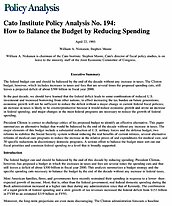The federal budget can and should be balanced by the end of the decade without any increase in taxes. The Clinton budget, however, which includes increases in taxes and fees that are several times the proposed spending cuts, still leaves a projected deficit of about $300 billion in fiscal year 2000.
In the past decade, we should have learned that the federal deficit leads to some combination of reduced U.S. investment and increased borrowing from other nations, in effect increasing the tax burden on future generations; economic growth will not be sufficient to reduce the deficit without a major change in current federal fiscal policies; an increase in taxes is likely to be counterproductive because it would reduce economic growth and invite an increase in federal spending; and major changes in the main federal programs are necessary to reduce the growth of federal spending.
President Clinton is correct to challenge critics of his proposed budget to identify an effective alternative. This paper summarizes an alternative budget that would be balanced by the end of the decade without any increase in taxes. The major elements of this budget include a substantial reduction of U.S. military forces and the defense budget, two reforms to stabilize the Social Security system without reducing the real benefits of current retirees, several alternative reforms of medical care programs to reduce the increase in the relative prices of and expenditures for medical care, and 50 specific reductions in discretionary domestic programs. A serious effort to balance the budget must sort out our fiscal priorities and constrain federal spending to a level that is broadly supported.

This work is licensed under a Creative Commons Attribution-NonCommercial-ShareAlike 4.0 International License.

